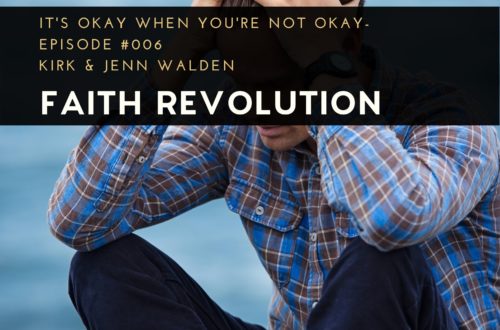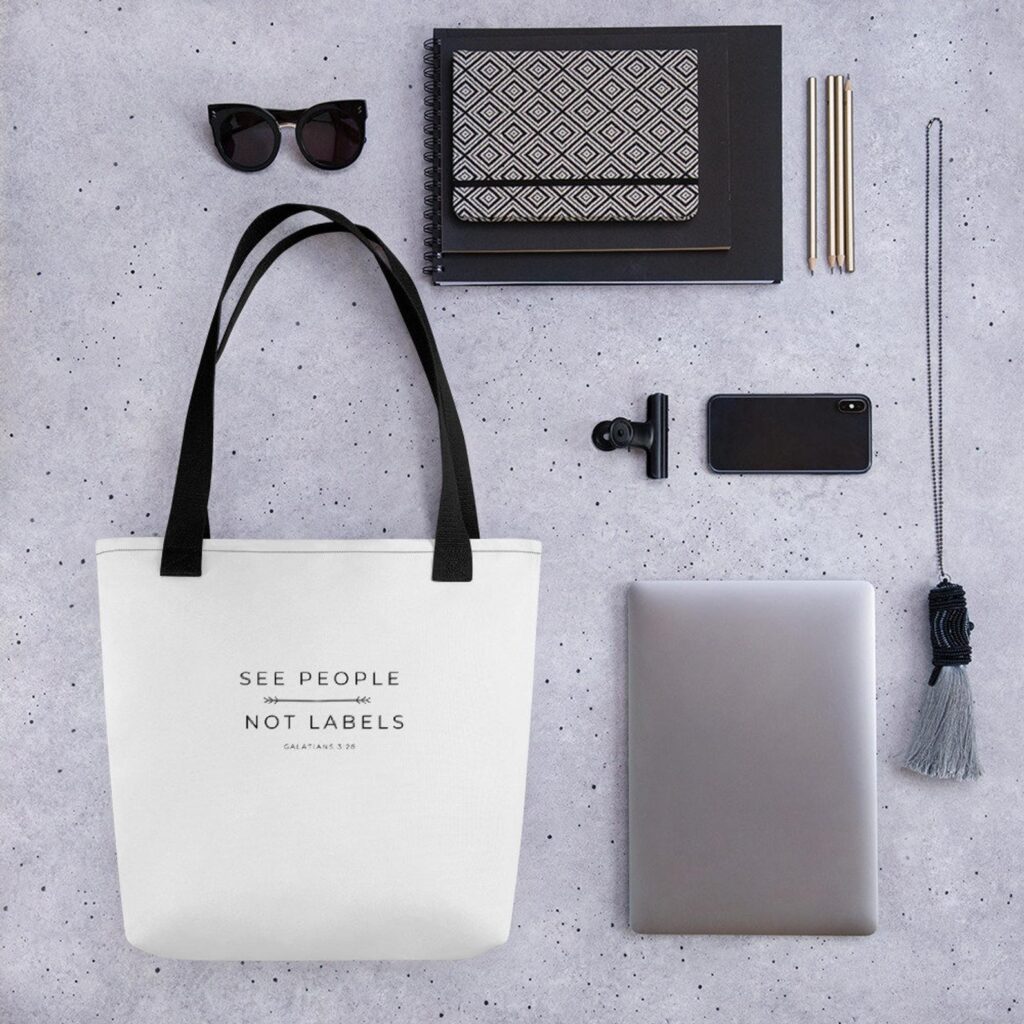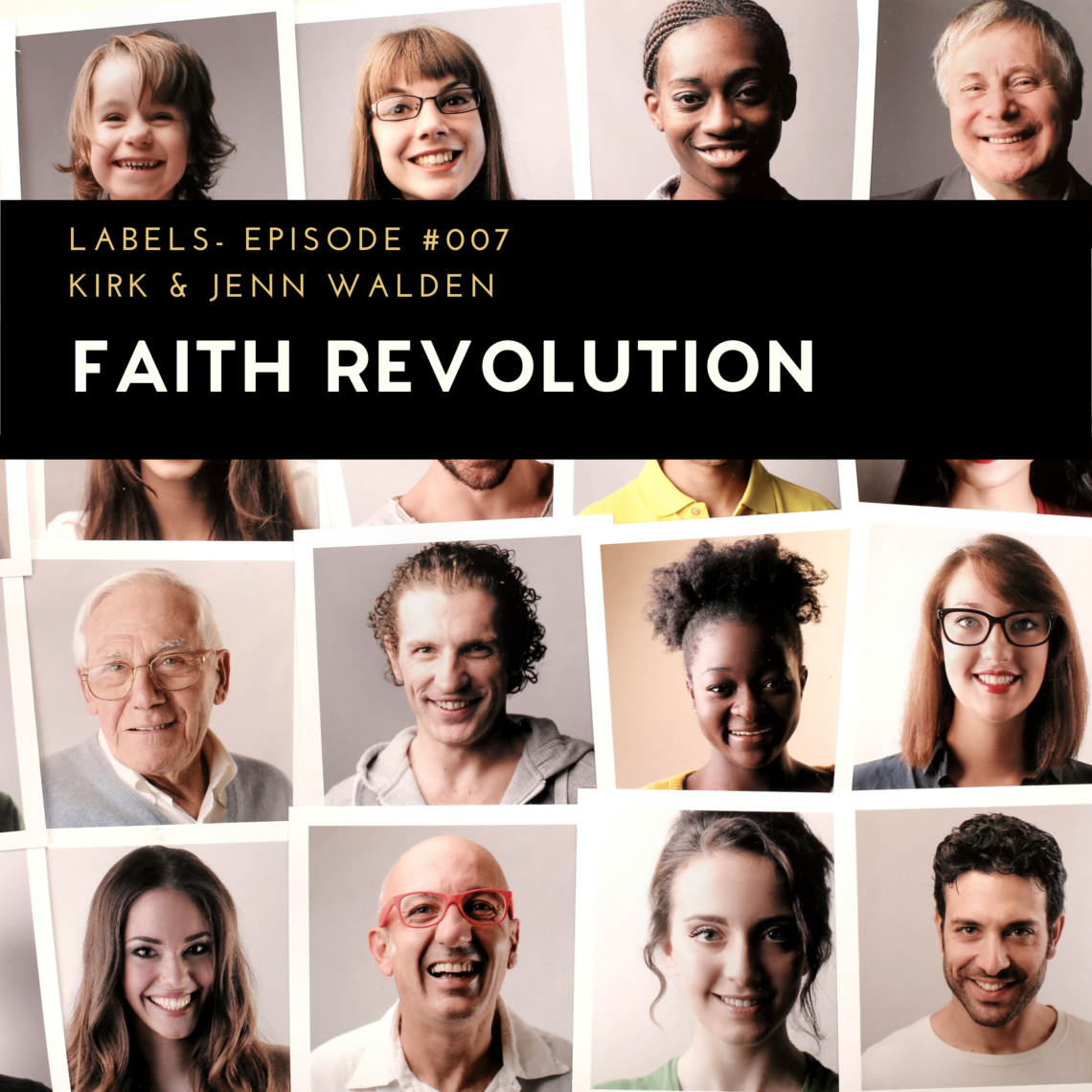
Labels
In this episode, “Labels”, Kirk and Jenn discuss how labels affect our faith and influence. Including labels we put on ourselves, the labels we place on one another, and the actual labels God wants us to wear.
To Consider
- What affect have labels had on you personally, both good and bad?
- In what ways have labels affected your relationships with other people?
References (Click Link)
- Bible: Paul’s Thought Regarding Labels
- Bible: Rahab and Salmon
- Bible: Woman in Adultery
- Bible: Fruit of the Spirit
- Bible: The Greatest Commands – Matthew 22:36 – 40
- Bible: Good Samaritan
- Bible: Jesus did Good, God was with Him
- American Cancer Society
- Goodwill Industries
Episode Transcript
Kirk: It’s great to have you on the podcast, and today is one of those uncomfortable ones. We’re going to be talking about labels.
Jenn: Labels. This topic has been something on my heart for some time now. I just feel like there’s a lot to uncover in this topic for us, as men and women of faith.
Kirk: There is. And I look at it as labels we put on ourselves, I want to talk about that. Labels we put on others, and then there is a label I believe God wants for us. So I want to jump in here and talk first about labels that we put on ourselves. And this is tough, because to be honest with you Jenn, there are labels that I’m very comfortable with. I want some labels. Are you the same?
Defining Labels
Jenn: Yeah, I agree. I think to really get to the root of it, first of all, labels are things we start collecting from the time we are very young. Labels are a natural part of human existence. I don’t think either of us would even say they’re bad necessarily, but I do think that they can become an enemy of who God wants and needs us to be.
Kirk: Yeah, exactly, right. Well, I look at my life and there are labels that I have carried somewhat proudly at times, you know my work with Life Affirming Ministries, that gives me one label. Our faith can give us a label in some ways. I get very comfortable with those and I go, “Okay, this means I’m part of a tribe.” And if I feed into that label, I know that I’m going to get some attaboys. People are going to go, “Go get ’em Kirk, this is great.” And so I get very comfortable with that, and I want to live in the label and that’s where it gets tough.
Jenn: Right. Yeah. So maybe we start by asking, “What do we mean by the word label? How would we even define that word?”
Kirk: Well, that’s a good one. Well, I see it defined as things we believe, maybe theologically. We can look at denominations as labels, our beliefs, our political views.
Our views on political issues can definitely be labels. I’m a this, political party, or you’re a that because you are to the left of me or you’re to the right of me, and so we got these labels that we create.
Labels We Wear
Jenn: Yeah, I agree. So what are the labels we put on ourselves. What are the labels that we put on ourselves that we carry and why?
Kirk: Yeah, and again, I would say that it’s because it makes me comfortable. I want to have certain labels so that people look at me and go, “I’m one of you, and I’m in the bunch, I’m in the tribe.” I also want people to look at my labels and say, “he’s not one of me.” It’s funny because I kind of create enemies that way if I’m not careful.
Jenn: Yeah, I do think labels are very deceptive sometimes. Labels can be bad, that we are carrying like I’m not a good person, I’m not this, I’m this. I’m never gonna be successful. I’m a liar, I’m this. We can carry those kinds of labels that are very, very damaging to our identity as men and women in Christ. And sometimes, we’re carrying them and we don’t even realize it. It’s so subtle, it’s this narrative we constantly play in our head.
Kirk: That’s right. Yeah, and there are others that carry around labels of, the past I used to be this and so I’ll always be this…
Jenn: Right.
Kirk: I was an addict, I’m always an addict. I understand the need to recognize the temptation of addiction, I get that, but when we wear the label, there are things that God wants to break through. He wants to break through the labels to something deeper, and I think sometimes we carry that label and it gets comfortable. We might say, “Well, I’ve always been this, this is what I’m always going to be,” it could be our ethnicity, another label that we can wear. I’m proudly this or whatever it might be, and I know we’re trying to be careful not to say the labels, because we don’t wanna get that in our heads.
It’s just so hard because we do get caught up in these things. And you know, the fact of the matter is, Jenn, we’re always going to have to deal with them in some way. But what we want get to in this podcast is how do we break through those to something deeper, that even if somebody sees us as a certain label, they see something greater than the label. That’s where I want to go.
Jenn: Yeah, I think just to me, to start with the labels we carry, that we put on ourselves, and maybe it is because somebody said something to us as a kid. Or it could be like I said earlier, the narrative of our own mind, a failure or whatever. I think a lot of us carry that into our adulthood and never realize it. But I think there’s hope because I don’t think this achieves God’s purpose for us. I don’t think it achieves the kind of fruit He is asking us to be. You and I talk a lot about being good fruit, we don’t want to be bitter, we don’t wanna be sour, we certainly don’t wanna be rotten fruit. So how do we become that good fruit that God wants us to be? I think it’s very selfish on God’s part. He wants us to be good fruit, because that’s what will attract people to His team, that’s what will attract people to the hope and joy that He has for us. But when we carry around these negative labels, it can create a root of failure and bitterness in us. To me, I think there is so much power and just recognizing that’s not Him. That’s not what He wants for me. It’s like a disease really, when I carry these negative labels.
I think it’s very selfish on God’s part. He wants us to be good fruit, because that’s what will attract people to His team.
Kirk: And even when we create positive labels for ourselves, the challenge is our tribe. I’m comfortable with the label ’cause my tribe loves it. However, if we’re talking about reaching people with the hope of faith, if we’re talking about that, these people may see our label we’re so proud of, in a terribly negative light and never listen to us because of the label we put on ourselves.
Jenn: Yeah, I honestly used to look at it as weakness in myself when I would hide a label. For example, when I was with someone that I knew might get offended by a particular label, I would hide that label. As an older person who’s lived a lot more life, I realize that that’s actually strength and maturity. Of course, I think the enemy of God and the enemy of us as people wants us to think that if we’re not proudly standing up for whatever label we think we’re supposed to be carrying, that that’s weakness. But I mean, look at Paul, look at what he said. Paul thought people were more important than labels. It is strength to be able to sit in a moment and cast aside whatever it is I think is so important that I am putting between myself and another person. I cast aside a label to just be in that moment of loving that person, that’s strength… Wow, I want that.
Labels We Place On Others
Kirk: I do too, and so I’m having to rethink how I view the labels I put on myself. I want people to see something beyond the label, and so what is it? And this is what we’re moving toward, what is it that God really wants for us to exude in front of other people, is it the label or is it something greater? And that’s where we want to go, because first we put labels on ourselves, right, we talked about that. Then we put labels on other people, which diminishes our ability to reach out to them. Because as soon as I place a label on someone, I create all of these misperceptions in my mind. I don’t want to look at the whys of that label, I just want to look at it and say, “Well, you are one of those, and maybe I need to fix you. Maybe I need to set you aside and not engage with you because you’re one of those,” and we lose so many, possibilities, so many opportunities to speak into somebody’s life and to just engage with them and maybe be a friend.
We put labels on other people, which diminishes our ability to reach out to them…. I create all these misperceptions in my mind. I don’t look at the whys of that label, I just want to look at the label and say, “Well you are one of those, and maybe I need to fix you.”
Jenn: And I think it’s one of the hardest things we do, because it’s so much easier to have a label, to pick a side, I’m right, you’re wrong. And just be done with it. It feels safe and it feels justified. I have felt very justified in some of my labels, and even as I’m looking at it differently, I’m still stopping myself and thinking, you’re not giving that person a shot, you’re just looking at them as a label, and that ain’t God’s way, that is just not how He ever does things.
Kirk: And it’s very subtle, especially in Christianity today, because this person has a different view on this particular theological issue, right? They’re trying to follow Jesus. I’m trying to follow Jesus, but we have a little bit of a difference there. And yet we smile, and say we love you and all this kind of stuff. But underneath, they are always going to be that label in our minds, and I can never have full communion and full relationship with them. There’s always going to be a sticking point because of their label. Maybe they are doing the same thing with me. What are we really shooting for here? We’re letting an issue here or an issue there, subtly divide us. We do this all the time.
Labels We Don’t Want to Wear
Jenn: Yeah, and I think too, it’s… I hope I can make this point. It makes sense in my head but you know how that goes in getting the words out [chuckle]. It doesn’t always line up, but I’m thinking about when I was diagnosed with cancer when I was 29. I got involved in the American Cancer Society, or is it the American Cancer Association? [chuckle]
Kirk: No, it’s American Cancer Society, it’s ACS. You’re right.
Jenn: Okay, me and details. All right, so I get involved and I really can’t say enough about what they do to help the families and individuals hit by this horrible disease, but what happened was right after I finished my treatments, (which was for anybody that knows my story, just grueling. It was just this massive attack on me in so many ways in my life), I had lot of people who wanted me to become kind of a spokesperson for this issue of cancer.
Kirk: The face of the ACS in the community.
Jenn: Right.
Kirk: Relay for Life, and those things. Great. Great stuff.
Jenn: Yeah which I love those programs and it’s amazing what’s been done. I would not be here without those movements and those fights to help find cures for cancer. I would not be alive today. And I’m so painfully aware of this, but it was very hard for me to wear that label, and I didn’t want to. To be honest, I just mentally could not, because even though I knew there is a very high likelihood this cancer will never return, you know, there’s still that small percentage that it could. And having to live in that place, I couldn’t separate it. I wish I was strong enough to separate it and just do the things, but I couldn’t.
I think about very precious friends of ours that are post-abortive and they’ve been courageous and they are willing to say, “I did this,” and wear that label, but the truth is, they are not that label. They don’t want that part of their past to be their identity.
I think that sometimes we think people want to wear a label, and we need to be so careful in assuming that. I think about people and their ethnicity, people in so many different places.
Jenn: I think of some conversations with some friends of ours that, “You would look at them and you would want to slap a label on them,” and they’re like, “I don’t want that label. I am a person, look at me, look into my eyes and see who I am, I’m not a label.” So I kind of went on a tangent, but I just think this is such a powerful thing for us to realize. Labels can be damaging, and sometimes we don’t see one another, we don’t see our hearts when all we see is a label.
The Labels God Wants Us to Wear
Kirk: Well, we get pigeonholed into those areas and we can’t seem to get out, and so we take on those labels even more and then, it all gets confusing. Here’s the thing though. God, we know we’re not gonna eliminate labels, put it that way, but God wants us to break through all of that to be something greater than the label, and that’s the challenge we all face.
I can’t stop people from labeling me in certain ways, whether it be my political views, my theological views, my work, any of that. I can’t stop that, but what I can do is rise above it, and that’s what Jesus did so incredibly well. We were talking about it earlier today, you and I, when we were discussing this podcast. Jesus was labeled as a guy from Galilee. The Pharisees labeled him in all sorts of ways. Everybody seemed to have a label for Jesus, but every time they tried to stick a label on him, he broke through it, and he saw people in different ways. When people would see labels on people, Jesus would break through.
We were talking about the woman caught in adultery, well, she’s an adulterer, and that’s her label. So let’s stone her and Jesus, instead of saying, we don’t need to use labels or anything like that, he said basically, “Okay folks, if you wanna play the label game, let’s label things this way: Anybody who’s not a sinner, go ahead and throw a stone” Well, all of a sudden they couldn’t play the adultery game, they had to say, if we’ve ever sinned against God, we don’t get to throw a stone. So he broke through all of that, and he found the heart of a woman who was broken.
Jenn: Yeah, and we were talking too, I just love the thought that God loves to work with people through their labels, because He shines greatest in those moments. He gets to say, “Oh, you think that’s who this person is? ” I thought about Salmon and… Did I say it right?
Kirk: I don’t know.
Jenn: Is it Salmon or Samon? [chuckle]
Kirk: I don’t know. All I know, is we find him in the Old Testament, and he’s the guy who married Rahab, the harlot. Label… Right?
Jenn: Right.
Kirk: There’s the harlot label…
Jenn: She’s the harlot for all of history.
Kirk: I want to say it again and again, Salmon is one of my heroes or Samon, whatever. But he’s one of my heroes because this guy saw through the label of harlot and saw the heart, and as a result, Salmon and Rahab gave birth to Boaz. Boaz saw through the label of Ruth as a Moabite and saw her as someone he wanted to bring into his home, and then we see this line leading to Jesus. Leading through David to Jesus, and I go, “Okay, there’s Salmon who saw through all the labels, and this changed the world, leading to our Messiah. Wow.
Jenn: I have goosebumps right now thinking about the power of God to say, “I will not be limited by your labels. Humanity, I will not play your games.” I want to be the kind of person who is running through life with the new lens of freedom, where when I do have a moment with somebody, it’s me and you, we’re in this together, I’m not going to allow a label to get between me and you and the love of Jesus Christ, his death, burial, resurrection, and the freedom that He can bring to us beyond anything. These labels become ridiculous.
Kirk: I was hoping you’d use that word, I thought, “if she says ridiculous, I’m with her”.
Jenn: As your sister would say, ” Ridonkculous.”
Kirk: Yeah, [chuckle]
Jenn: You know, I don’t care what it is. What label is more powerful than the label of Jesus Christ on our lives? You think your ethnicity, your gender, your wealth status or lack thereof compares? What label is more powerful than the label of Jesus Christ stamped on you? Which isn’t a label, it’s not a label because it can’t be removed. It’s there to stay.
Kirk: That’s right, it is there to stay. And I think Jesus showed us, how to break through this stuff. And again, he did it with the woman caught in adultery. He did it with Samaritans. We tell the story of the woman at the well and how he went through Samaria and talked to her and she said, “You Jews,” label, “you don’t speak to us, do you?” And he offers her living water, and this Samaritan woman, there’s the label again, ends up becoming the first person that he says plainly to, “I’m the Messiah,” and she becomes, his first evangelist, because she goes and talks about Him. Later on, we’re talking about the greatest commandments, and Jesus says, “You should love the Lord your God with all your heart, soul, mind and strength.” And the second commandment is like it, you should love your neighbors as yourself. He gets a question, who’s my neighbor? And he tells the story–of all people–of a Samaritan who reaches out to help, and so he blows up the idea of labels through a story of what love looks like. And I think Jesus was committed to looking beyond the labels, to break through labels to the heart of the matter.
Fruit of the Spirit
Kirk: And I look at us, Jenn, and people will label us in different ways, and I don’t need to go through all of them, but despite those labels what will someone see? ” They may say, “Well, Kirk has this label, but,” -and this is the but I want-, “but he is a person of love, joy, peace, patience, kindness, goodness, faithfulness, gentleness, self-control, that’s who he is.” I want that to break through any label that they see. We want to be bigger than the label.
That’s the goal for me.
Jenn: I love it. It’s such a distraction, and it is not allowing for this incredible work of God when we allow a label to become what leads in our relationships. Like you said, I can find myself feeling judgmental of anybody who looks at my labels and says, “Well, aren’t they, isn’t she just blank,” or I feel like they’re judging me because of my label, or maybe they’re not being kind to me because of my label. I don’t care what it is, but can I push through and past all that to get in a moment with somebody, going over that whole nonsense that I’m a label, and you’re a label. No, let’s go around it. I love the fruit of the Spirit that you just listed, that’s the bait. That’s the thing that will shake the world and shake a person.
Kirk: Yeah, if we want to be fishers of men and women, there’s the bait. And it’s funny because it’s not saying . . . Here’s the thing. I’m involved sometimes in political things and talk about that, whatever, but what I want is for someone to look at me and say, “Well, Kirk is this, but you know what? I found that he is a person of love, joy, peace,” go down that list, that’s who he really reminds me of. That’s what really comes out to me. That’s what I want people to be able to say. It’s not to say we can’t speak out on things, but we do so with love, with peace, with all these things so that if we can do that, I think that the labels, they’ll never disappear. Just gonna say, they’ll always be there. People always want to do that. It’s comfortable, it’s easy to do that, but let’s create something bigger than the labels.
Religious Labels
Jenn: Even just the word Christian. Yes, I’m a Christ follower. It is every ounce of who I am, but even that label of Christian, it’s shallow in a weird way. It’s got to be who I am radiating. It’s got to be… You’ll know and they’ll know that we’re Christians by our love for one another, that it must be the fabric, the fiber of who I am in a very tangible, deep way.
Kirk: Ooh, you just hit me with something there because I’ve got a label maker.
Jenn: Yes, you do.
Kirk: And I love my label maker. I label my file folders. I won’t write on a file folder, I always put the label on. That’s exciting for me. It’s one of my goals in life is to be a great label maker and organized, but what I see you saying is, we could get that label maker and stick the label Christian on our forehead that we place out in front and people see that. Or, they see a reflection of Jesus Christ.
Which one are they going to see? Are they going to see the label or the reflection? And they go, “Oh, okay.” If they see the reflection, they’ll say, “Well, this person radiates what I think Jesus looked like when he walked this Earth.” Or is it a label that just sticks there that people begin to judge.
Well, a Christian is a good thing or a Christian is a judgmental bad thing because again, different perceptions. If we wear the label proudly, just remember that there will be different perceptions of that label. Our tribe will love us. Those who don’t believe like we do are going to be angry with us.
Jenn: I have a quick story about that, and you know this story, but it was so powerful for me. I have a shirt that says, “What’s your story?” Which . . .I love that shirt, but on it there is a Christian symbol and the word faith.
Well, I was going to Goodwill and I didn’t think much of it. I throw on that T-shirt, I’m unloading and this man working at Goodwill, said, “Oh, what’s your story?” And then he starts talking to me and he says, “Boy, I could tell you some stories.” But then he looks and says, “Oh, is this a church thing?” And I was like a deer in the headlight. I’m like, “Ha? What do I say to him?” I want him to keep talking, but I can’t be dishonest, “Yeah, it is.” It changed everything. And then he began telling me about negative experiences he had had in the church, and all I could sit there and say is, “I’m sorry.”
Kirk: That’s it.
Jenn: That’s it. It ended the conversation, and I hate that he just saw a label on me all of a sudden, because before he saw that label, he was really opening up about his life with me. I don’t know where it would have led. I want go back and find that guy. I’ve literally gone back, but I’ve never seen him again. I wanted a chance to do better, but I don’t know. I just think it was such a powerful experience for me of, I missed out on an opportunity. Was that his fault? Well, yeah, but when he was telling me some of the things that had happened to him because of church, literally just some of the damaging things that I couldn’t deny, it shut down my opportunity to just be love to him.
Kirk: And that’s hard for me and for you to hear because we created the t-shirt.
Jenn: Yes.
Kirk: We love the t-shirt that says, “What’s your story?” But we added a Christian symbol, it said something about faith on it, and we thought this is great. And yet someone saw the label, which kind of led to this podcast today, and just to be honest, we don’t wear those t-shirts anymore.
We’re not putting them out there because, what’s your story is great, but once we added the label, we saw, and I think God used that guy to help us see something. Because we were proudly putting our faith out there, and yet it came and backfired on us.
Jenn: And like I said, I would have told you in my past life, my past experience, “Oh, you’ve got to be brave, you must be courageous. You must take a stand,” and I hear this within Christianity, but I am realizing, no. The strong place to hold on to in faith is, I will be whatever I need to be in a moment for somebody to see the love of Jesus Christ radiating from me. No label is going to share that powerful, amazing love. No t-shirt, and I love my friends on Facebook, but not even some big post. I’m not saying, stop it, but I’m just saying even that leads with a label.
The strong place to hold on to in faith is, I will be whatever I need to be in a moment, for somebody to see the love of Jesus Christ radiating from me. No label is going to share that powerful, amazing love.
Kirk: We just need to look at this in light of– what do we want to reflect?
Jenn: Yeah, because our tribe will be sitting there cheering, “Ooh! Way to go! Yeah, you say it girl, you got this!”
Kirk: Over 100 likes.
Jenn: Yes! Woohoo! But… Okay, do I want to grow the tribe or do I want to isolate and circle in the wagons? I believe we’re being called to reach out to a hurting world, and sometimes that means I have to do the hard thing and die to myself, which is what I think this whole label thing is about, it’s about dying to ourselves. Because we do get worth in these labels.
Kirk: I know I do.
Jenn: Yeah.
Kirk: And it’s funny, I go back to Peter when he was sharing for the first time publicly, and he said, “Jesus… ” And I don’t have this in front of me, but Jesus was a good man. He was a man who went about doing good. I’m like, “Wait a minute,” He didn’t mention he was a Jew like us. He didn’t mention all these different things in the beginning, it was just . . . He was a guy who went around doing good. It was very simple. And so as we wrap this up, I think maybe for time’s sake, we need to do this, but I want go back and say, labels, we put them on ourselves sometimes because it’s very comfortable to be part of the tribe, but is that what we really want in our lives?
Jenn: Yeah. And I always want to go back to the labels we put on ourselves that are damaging, because the voices of defeat–God does not want that for you. God is going to, if you let Him, peel off the labels. It will be like a band-aid, it might hurt to rip off that label, but He does not want you wearing those damaging ridiculous labels.
Kirk: Of what I used to be, or a decision I made years ago, or anything like that. So labels, some of them are good that make us feel comfortable, some of them are bad and we feel like we need to put them out there to be vulnerable or whatever it is. It’s like Paul said, “Yeah, I’m the chief of all sinners,” but he went right on past that. He didn’t walk around saying, “Folks, I’m the chief of all sinners, speaking to you, and so let’s talk about my label of Chief of all . . .” He did it maybe one time and moves on. The second point is that we put labels on others and this closes off our ability to connect with other people because we get these preconceived notions ourselves, and we’re unable to be in the moment.
Jenn: And we don’t see their heart, we don’t see their eyes, we just label them. And really, when we do that, we’re throwing people away. Oh, my goodness.
Kirk: I don’t want you to say that. Let’s move on to something nice. No, that’s true, we do. We set people aside and we do it quote, “in love,” well, they’re just outside of God, under his will or whatever it is, and no. We don’t. Jesus didn’t cast anybody aside, He didn’t do that. He always gave opportunity, no matter the label. Tax collector, sinner, adulterer, all these people got opportunities because He never cast anybody aside with a label. And then finally, what’s the label God wants for us?
Jesus always gave opportunity, no matter the label. Tax collector, sinner, adulterer, all these people got opportunities…
Jenn: Oh, I am gonna say this just so we were very fair and transparent here, he did label people, you hypocrites. [laughter]
Kirk: Well, that’s true. But you know what? He labeled them because of behaviors and not because of something they could do nothing about or something in their past. It was often the religious leaders attacking Him, and He had to . . . I don’t think he was labeling, but identifying who they were. You’re being a hypocrite, you’re looking at the outside instead of looking at the heart, and I have to call that out so he did do that from time to time. That’s fair. But finally, let’s touch on that last topic one more time, the label God wants for us. I think He wants me and you, Jenn, and our listeners, I know we’re in the same boat with this that we want to be reflections of who Jesus is. We want to be that reflection, not a label of even I’m a Christian, although that’s not a bad label, but there’s something greater than that.
Jenn: Yeah, that just radiates joy and peace and love, and that’s what’s going to turn the world upside down. That’s what’s going to turn somebody’s day upside down. God is for me. He’s for you. Who the Son has set free, he’s free indeed. That’s what will wake us up. That’s what will help us to look past labels and see the heart of every child out there that God wants to call into Himself.
Kirk: I don’t need a label that drags around my past with me. I don’t need a label to proudly proclaim something I believe, or think about, or whatever it is, or my ethnicity or anything like that. I don’t need that. The greatest thing we can do is reflect who He is in us, and if we can do that… There will always be labels, but if we can reflect, we’re going to win people with that bait.
Kirk: We put labels on ourselves, we need to be very careful about that, and we also need to be careful about putting labels on others. And I think what we need to do is be a reflection so that the labels fall aside and people see the true heart of who we are, and that we see the heart of others as well. We do that, we’re doing pretty well. Thanks for joining us today. It’s great to have you with us and we look forward to talking to you next time.
Shop Items Inspired by this Episode...
Pin this Post...

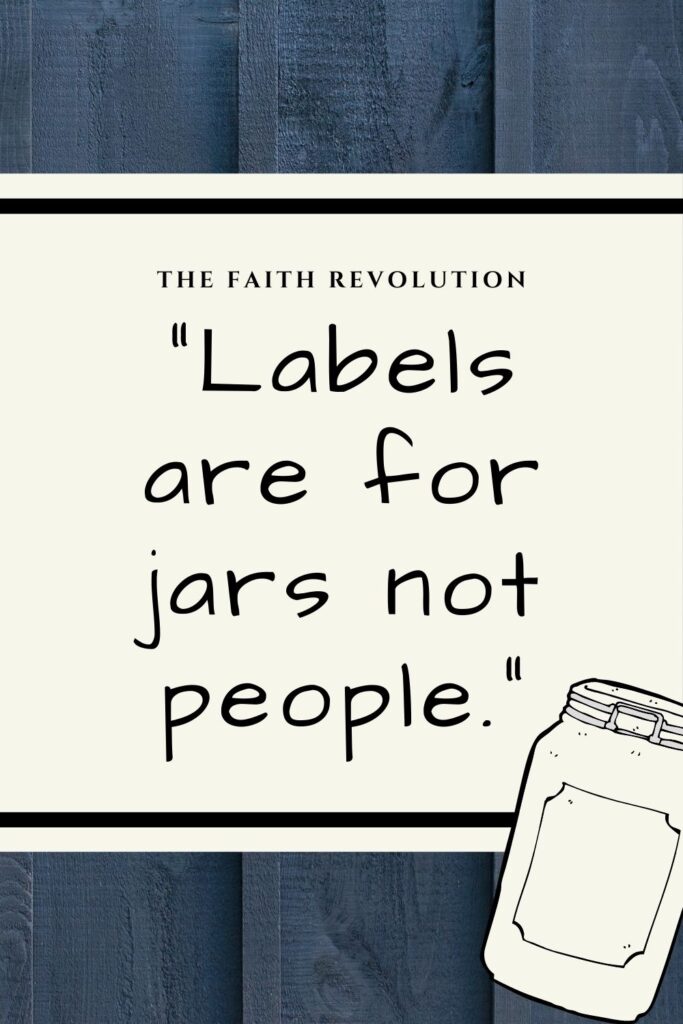

Kirk Walden is a Christian speaker and author. He works with ministries across the world as a consultant and advancement specialist.
The Faith Revolution Podcast was born out of a desire to see faith become more accessible and culture changing -anyone at anytime can have faith.
Accessibility is found in peeling off layers of religious complexity and embracing the deep roots of simplicity found in Jesus.
Click here to find Kirk’s Event Schedule.
Kirk’s wife, Jenn Walden, is a frequent co-host of The Faith Revolution Podcast. She can be found at her home on the web, Jenn’s Closet; a community where women are uniting as influencers of fashionable faith.



You May Also Like
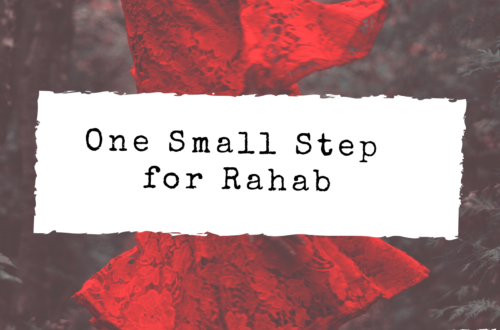
One Small Step for Rahab
December 29, 2019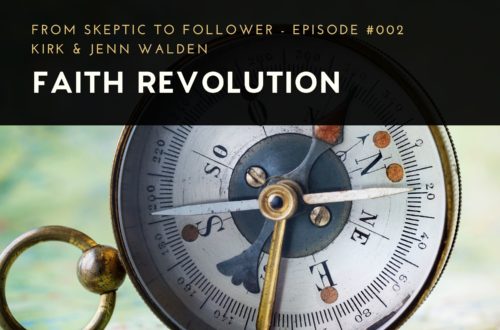
From Skeptic to Follower
May 5, 2020